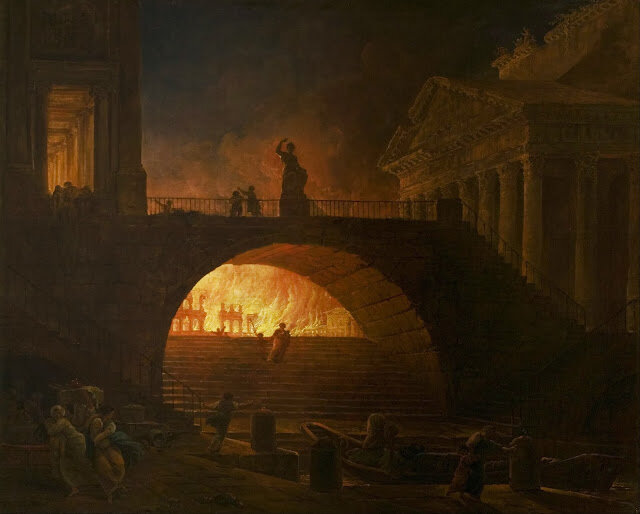Environmental Hazards in RPGs- Where there's Fire, there's Smoke!

Last Thursday the D-infinity Live Episode "The Road Goes Ever Onward" focused on the trials and tribulations of travel in RPGs. At one point I started talking about fire as it is represented in RPGs. I thought I would write a little about that here.
Fire is a very common "damage type" in a lot of games. From torches to fireballs to dragon's breath, in a fantasy game based around a preindustrial culture, fire is going to be around all the time. But just because a a fire-breathing dragon is probably not a common encounter on a Friday night tavern crawl, that doesn't mean that historically people were lax about care around fire safety, or even paranoia.
And for good reason. The Great Fire of London, one of the best know conflagrations of the pre-modern world, raged through much of central London, destroying thousands of houses, and was only contained because of reasonably effective fire-fighting measures and a fortunate change in wind direction. It is believed that the fire started in a bakery. The Great Fire of 1666 is the best known, but other major fires struck the city on at least four other occasions.
The Romans also lived in fear of fire. The vigiles urbani were the police and firefighters of the Roman Republic, were expanded from the time of Augustus, and were equipped with water pumps to fight fire, or at least to keep it from spreading. They did regular patrols, especially at night, for possible fires. Nonetheless, the Great Fire of Rome in 64 A.D. lasted for six days, and affected about 2/3 of the city.
Fear of fire, and the desire to prevent it makes a lot of sense any time. But when housing is close packed and composed of flammable materials, roads are narrow and winding, and people must use oil lamps for light and fires for cooking, the possibility of conflagration is very real.
So what then of its effects in a fantasy city? In a magical world, there might be magical means to fight fire: sorcerers who can summon water elementals, or simply conjure water. But this will be balanced by the looses cannons (another term for "adventurers") who toss fireballs around with nary a thought as to the consequences, not to mention the villains who actually want to do harm or start a blaze.
It makes sense that organized locales - cities, castles, etc, where there is the rule of law - might restrict the use of fire, especially magical fire, and severely punish those who flout the rule. Particularly cautious rulers might even require registration of any mages who control fire in a significant way. Or they might press them, along with water mages, into a fire prevention service. In a large city, that might have a version of the vigiles urbani, ANYONE playing with magical fire would be suspect, and possibly arrested on the spot.
Fire can be devastating to cities and property. But it is also horribly damaging to people, of course. Fire literally consumes flesh. Yet, often in games, fire is glossed as just another "damage type". Fireballs explode, damage the bad guys, then politely fade away so we can walk in and loot the remains, where we are not impeded by the fires rapidly spreading to the nearby market stalls, where bystanders have not been so much as singed, and where we adventurers look at our new-found treasures without giving a second glance through the deadly smoke at the horrifically scarred bodies.
And smoke is deadly. In modern fires, roughly half of those injured or killed are affected by smoke inhalation, which can overcome someone in seconds as the lining of your lungs is coated with the residue of inhaled smoke. Fires in a pre-modern or fantasy world, where flammable materials are probably more common, will likely also produce more and thicker smoke, when things like manure and oily wood catch flame. And despite the work of any vigiles, it is highly unlikely they will be more effective than a modern squad of firefighters. In the previously mentioned cramped, flammable, living conditions, the fatalities from smoke are likely to be higher that those in modern fires, even though modern fires can involve nasty chemicals that were less common hundreds of years ago.
So, how can we inject a little realism in our fantasy? I am not suggesting that we need all sorts of tables for fire spread and smoke inhalation.I suggest the GM exercise some preemptive common sense about smoke and fire.
Fireballs in a tavern or marketplace, or even the castle of a villain, are likely to spread more quickly, and to more devastating effect, than application of the same magic in a cavern (although it could certainly be argued that a fireball in a cave can consume oxygen, and cause smoke that will linger for a long time).
If a GM wants to enforce a little verisimilitude, I suggest that you lay out the possible ramifications of that fireball, ideally before the PC wizard or sorcerer enters town, allowing them to prepare another spell, or come up with other tactics. The same goes for fire-weapons. A barbarian flailing around with a flaming greatsword, or an archer in the habit of shooting fire-arrows could set a stable full of hay alight easily, or trigger an explosion in a granary. If that happens, describe the fire as a complication, use the smoke to alter the battle site, and reward players who take measures to control the fire or its damage, during and after the fight.



